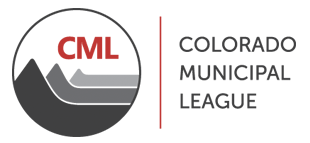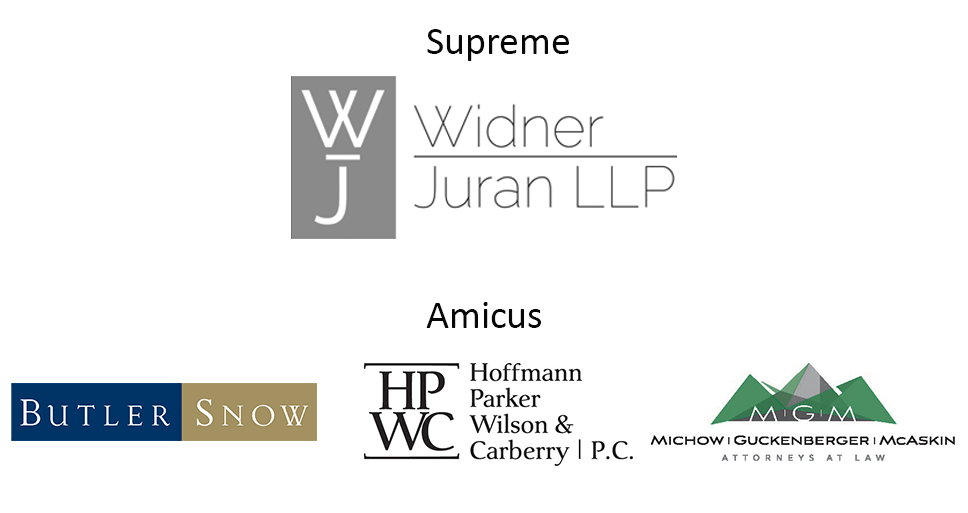
Annual Seminar on Municipal Law
September 20-21, 2024
CML's Annual Seminar on Municipal Law provides expert Colorado-specific information that is directly relevant to the daily practice of municipal attorneys in the state, as well as opportunities to network with peers.
We look forward to seeing you in Colorado Springs this Friday & Saturday, September 20 & 21 at the Antlers Hotel, 4 S. Cascade Ave., Colorado Springs, CO 80903.
Please scroll down to the agenda where you will find the presentations and any additional handouts for the Seminar. Click on the carrot to open the box and then on the presentation link. Please note that we will not be printing any hard copies of the materials.
Thank you to our 2024 Sponsors!
Annual Seminar on Municipal Law Agenda
Friday, September 20
Registration, continental breakfast and connecting with colleagues.
This session will review Colorado, Tenth Circuit, and U.S. Supreme Court appellate decisions of interest to Colorado municipal attorneys, reported between October 6, 2023, and September 19, 2024. Areas of focus include Constitutional issues, employment
law, municipal liability and government immunity, law enforcement, campaigns and elections, sunshine laws, eminent domain, and land use.
Speaker: Robert Sheesley, general counsel, CML
Presentation
The Protections for Public Workers Act (PROPWA) established new workplace rights for most Colorado municipal employees, many of which mimic certain rights granted to private sector employees under the National Labor Relations Act that were heretofore inapplicable in the public sector- including the nebulous right to "engage in protected, concerted activity for the purpose of mutual aid or protection." In this session, we'll review the Act's requirements and the Department of Labor and Employment's implementing rules, then turn to best practices for both union and non-union environments.
Speaker: M. Brent Case, partner, Semple, Farrington, Everall & Case
Presentation
So, you've been served with a federal lawsuit involving parts of the US Code you had no idea existed. Now what? In the context of a federal Voting Rights Act case that was filed against Colorado Springs, this presentation will discuss practice pointers including: finding outside counsel; scoping work; timelines, and budget; retention agreement terms; and briefing decision makers.
Speakers: Erik Lamphere, litigation division chief, City of Colorado
Springs and Wynetta Massey, city attorney, City of Colorado Springs
Presentation
Handout 1
Handout 2
Handout 3
Handout 4
Natural Medicine - A Brief History, the Applicability of Colorado Law to Local Jurisdictions, and Local Regulations | 1:45 - 2:45 p.m.
The passage of Proposition 122 in November 2022 changed the landscape of local regulation with respect to the schedule I substances illegal under the Federal Controlled Substances Act, which have otherwise been legalized in Colorado. While local jurisdictions have more authority to regulate marijuana businesses, including prohibiting businesses in their jurisdiction, the same control was specifically prohibited with the passage of the Natural Medicine Health Act of 2022. In 2023, the State Legislature passed Senate Bill 23-290, creating the Colorado Natural Medicine Code, which provides the regulatory structure for the operation of natural medicine facilities, to include the licensing and registration of such facilities. This code provides certain limitations that can be utilized by local jurisdictions with respect to natural medicine facilities. This session will discuss a brief history of legalized natural medicine and how the Colorado laws are applicable to local jurisdictions and their ability to regulate natural medicine facilities within their boundaries.
Speakers: Michael Hyman, town attorney, Town of Castle Rock, Laurel Witt, assistant city attorney, City of Boulder and Jamie Wynn, town attorney, Town of Parker
Presentation
The April 2024 U.S. Supreme Court decision, Sheetz v. County of El Dorado, has caused cities, counties, developers and property owners to reexamine whether existing development impact fee programs and permit conditions could result in an unconstitutional taking. Come learn about the Sheetz decision and explore relevant fact patterns applying its holding in a dynamic game format.
Speakers: Jerry Dahl. partner, Murray Dahl Berry & Renaud LLP;
Alan D. Pogue, shareholder, Icenogle Seaver Pogue, P.C. and Caitlin
Quander, shareholder, Brownstein Hyatt Farber Schreck
Presentation
Saturday, September 21
Continental breakfast
Protest Management, Parade Permits, and First Amendment Litigation Regarding the 2024 Republican National Convention| 8:30-9:30 a.m.
The Republican and Democratic National Conventions are National Security Special Events
coordinated by the United States Secret Service and the host cities. Protests, demonstrations, marches, parades, and hooliganry should be expected and must be prepared for. This presentation will discuss mutual aid agreements through
the national Emergency Management Assistance Compact (EMAC), demonstration and parade permitting systems, First Amendment litigation with the ACLU, and the role of municipal attorneys as legal observers and police advisors during protests.
Additional topics will include out of state police use of force investigations, body worn camera recording release decisions, department policy priorities, arrest authority, and role responsibilities.
Speaker: Adam Stephens, deputy city attorney, City of Thornton
Presentation
Handout 1
Handout 2
Handout 3
Handout 4
Handout 5
Handout 6
Handout 7
This panel will discuss the City of Thornton's recent process in securing a 1041 permit for its Thornton Water Project from Larimer County, and implications for 1041 permitting going forward. The project serves as a case study for local governments seeking 1041 permits from other local governments, and how to approach similar large-scale, technical and controversial projects. As water must travers longer distances to serve population centers, and transmission facilities are extended to deliver renewable energy generated in rural areas to urban areas, the need for such permits will only increase. The team that secured the TWP Project will discuss lessons learned and the melding of legal criteria and non-legal advocacy in these situations.
Speakers: Claire Havelda, of counsel, Brownstein Hyatt Farber Schreck; Richard Rodriguez, attorney/shareholder, Hamre, Rodriguez Ostrander & Prescott, P.C; Carolynne White, shareholder, Brownstein Hyatt Farber Schreck and Tami Yellico, city attorney, City of Thornton
Presentation
Language matters. How we talk and write about even mundane topics adds context and framing to any discussion. The importance of language is even more critical when navigating sensitive topics, including those involving race, ethnicity, gender, sexual orientation, and gender identity. Engaging in these diversity discussions also provides an opportunity to display the fluidity of language in action - the ways in which terms evolve and groups choose new ways to self-identify. Lawyers must be able to bring their whole selves to the profession and lawyer leaders need to be culturally and identity competent to drive sustainability goals in a changing legal community. This workshop will discuss ways to move from good intentions to a concerted effort to cultivate identity equity within the profession and within your organization.
Speaker: J. Ryann Peyton, Colorado Attorney Mentoring Program (CAMP)/Legal Entrepreneurs for Justice (LEJ)
Presentation
Thank you for joining us.

